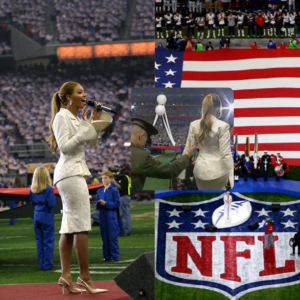This decision, which comes amid mixed reactions from fans and industry insiders, marks a significant shift in the league’s approach to celebrity involvement in its flagship event.
The “Beyoncé effect,” a term coined to describe Beyoncé’s unparalleled ability to attract viewership and engagement, has been a prominent feature of recent NFL seasons. Beyoncé’s attendance at NFL games has drawn significant attention from fans, media, and sponsors alike, leading to a surge in viewership and brand value for associated teams.

However, the NFL’s decision to ban Beyoncé reflects a broader sentiment within the league and its fanbase. Some critics argue that Beyoncé’s presence has overshadowed the core essence of the Super Bowl, diverting attention from the game itself to celebrity appearances and extraneous factors.
Roger Goodell, NFL Commissioner, addressed the decision in a press conference, stating, “While we appreciate Beyoncé’s impact on our league and the entertainment value she brings, it’s important for us to refocus on the sport and the athletes. We believe this decision will allow us to better showcase the game of football and the incredible talent of our players.”
The announcement has elicited diverse reactions from fans and industry experts. While some applaud the NFL’s move as a step towards restoring the integrity of the Super Bowl, others argue that Beyoncé’s involvement has been a positive catalyst for attracting new audiences, particularly young women.
The “Beyoncé effect” has undeniably influenced the landscape of sports and entertainment. Beyoncé’s ability to engage a wide demographic of fans has led to increased sponsorships and brand collaborations for the NFL. This trend has extended beyond football, impacting various industries and showcasing the potential of celebrity influence in driving consumer behavior.
The ban on Beyoncé from future Super Bowl events raises important questions about the role of celebrities in sports and entertainment. While celebrity endorsements and appearances can boost visibility and engagement, they also pose challenges in maintaining the focus on the core elements of the event.

Beyoncé’s impact on the NFL cannot be overstated. Her attendance at games has sparked renewed interest in football among diverse audiences, contributing to the growth of the league’s fanbase and commercial success. However, the decision to ban Beyoncé underscores the NFL’s commitment to prioritizing the sport and its athletes.
In conclusion, the NFL’s ban on Beyoncé from future Super Bowls reflects a broader effort to recalibrate the league’s approach to entertainment and celebrity involvement. While Beyoncé’s influence has been undeniable, the NFL’s decision signals a strategic shift towards recentering the focus on football and the game-day experience. This decision marks a pivotal moment in the evolving relationship between sports, entertainment, and celebrity culture within the context of major sporting events.
News
Paige Spiranac, a former professional golfer turned influencer, has found immense success in her career as a social media influencer, model, and media personality. With 3.9 million Instagram followers and 1.5 million on TikTok, she has become a prominent figure in the online world.
Paige Spiranac flattered to inspire others, including copycats, in Social Media success In a recent interview with The U.S. Sun at The SI Invitational, Spiranac expressed her…
Golf influencer Paige Spiranac knows exactly what some people think of her, and she had the perfect response ready for those critics.
Paige Spiranac posts brilliant response to sexist critics who think she does not know how to golf She played dumb in order to prove her point The Instagram…
PAIGE SPIRANAC delighted fans with her latest social media post.
The golf influencer loves to upload snaps of herself from various courses around the world. 28 Paige Spiranac posed in a figure-hugging black dressCredit: https://twitter.com/PaigeSpiranac 28 Fans love…
Paige Spiranac fans left distracted as she teases curves in busty outfit
Instagram influencer and golfer Paige Spiranac gave her fans an eyeful in her latest post. Paige Spiranac shares golf tutorial Fans of golf star and social media…
Crowned The King Of R&B, Chris Brown Has Amassed A 2024 Net Worth Of $50 Million
Chris Brown is an iconic and well-known singer, songwriter, actor and world-class dancer. Working since he was 16, Brown has continued to thrive within the entertainment industry and…
NFL fired Beyoncé after just 2 minutes on stage for singing ‘Alternative National Anthem’ at NFL.
In a world where celebrities often tread lightly around political and social issues, global superstar Beyoncé has never been one to shy away from making a statement….
End of content
No more pages to load











